Sulfonamide Allergy Safety Checker
Check Medication Safety
This tool helps you understand if medications with "sulfa" in their name are safe to take based on your allergy history.
Results
Enter a medication name and select your reaction type to see safety information.
Millions of people in the U.S. carry a label in their medical records: sulfa allergy. But here’s the truth most don’t know - many of them aren’t truly allergic at all. A 2022 study found that while 3 to 12% of people say they’re allergic to sulfa drugs, less than half a percent actually have a real IgE-mediated reaction. The rest? Misdiagnosed rashes, side effects mistaken for allergies, or outdated labels from childhood. And that misunderstanding is costing lives - not just through unnecessary side effects from safer alternatives, but by fueling antibiotic resistance across the country.
What Exactly Is a Sulfonamide Allergy?
The term "sulfa allergy" usually points to reactions to sulfonamide antibiotics - drugs like sulfamethoxazole (often paired with trimethoprim as Bactrim or Septra), sulfadiazine, and sulfacetamide. These were among the first antibiotics ever developed, introduced in the 1930s. Back then, if a patient got a rash after taking one, doctors labeled it an allergy. That label stuck - even when the reaction was mild, delayed, or unrelated to the immune system. True allergic reactions to these drugs are rare. They typically show up as hives, swelling, difficulty breathing, or, in extreme cases, Stevens-Johnson syndrome. But most people who report "sulfa allergy" had a non-allergic rash that appeared days after starting the drug - a common side effect, not an immune response. The problem? Once that label is in your chart, it stays. And it blocks you from using safe, effective medications - even ones you might need in an emergency.The Big Myth: All Sulfonamides Are the Same
Here’s where things get confusing. There are hundreds of medications with "sulfonamide" in their name. But not all of them are antibiotics. And crucially, they’re not all structured the same way. Antibiotic sulfonamides - the ones that trigger real allergic reactions - have two key chemical features: an arylamine group at the N4 position and a nitrogen-containing ring at the N1 position. These parts are what make them effective against bacteria… and also what make them potentially allergenic. Now look at nonantimicrobial sulfonamides: hydrochlorothiazide (for high blood pressure), furosemide (a water pill), celecoxib (Celebrex, for arthritis), acetazolamide (for glaucoma or altitude sickness), and sulfonylureas (like glipizide for diabetes). These drugs have the same basic SO₂NH₂ group - but they lack those two critical chemical arms. That means their immune profile is completely different. Your body doesn’t recognize them the same way. A 2022 review of over 10,000 patients showed that those with a confirmed sulfonamide antibiotic allergy had only a 1.1% risk of reacting to hydrochlorothiazide - almost the same as people without any sulfa label. The same held true for celecoxib and furosemide. In other words: if you’re allergic to Bactrim, you’re not automatically allergic to your blood pressure pill.What You Can Still Take - Safely
If you’ve been told to avoid "all sulfa drugs," here’s what you can likely take without risk:- Hydrochlorothiazide - one of the most common blood pressure medications
- Furosemide (Lasix) - used for fluid retention in heart failure or kidney disease
- Celecoxib (Celebrex) - a popular NSAID for arthritis pain
- Acetazolamide - used for glaucoma, seizures, or altitude sickness
- Metformin - yes, even though it’s not a sulfonamide, many confuse it with one
- Sulfates - like magnesium sulfate or Epsom salts
- Sulfites - found in wine, dried fruit, and some medications
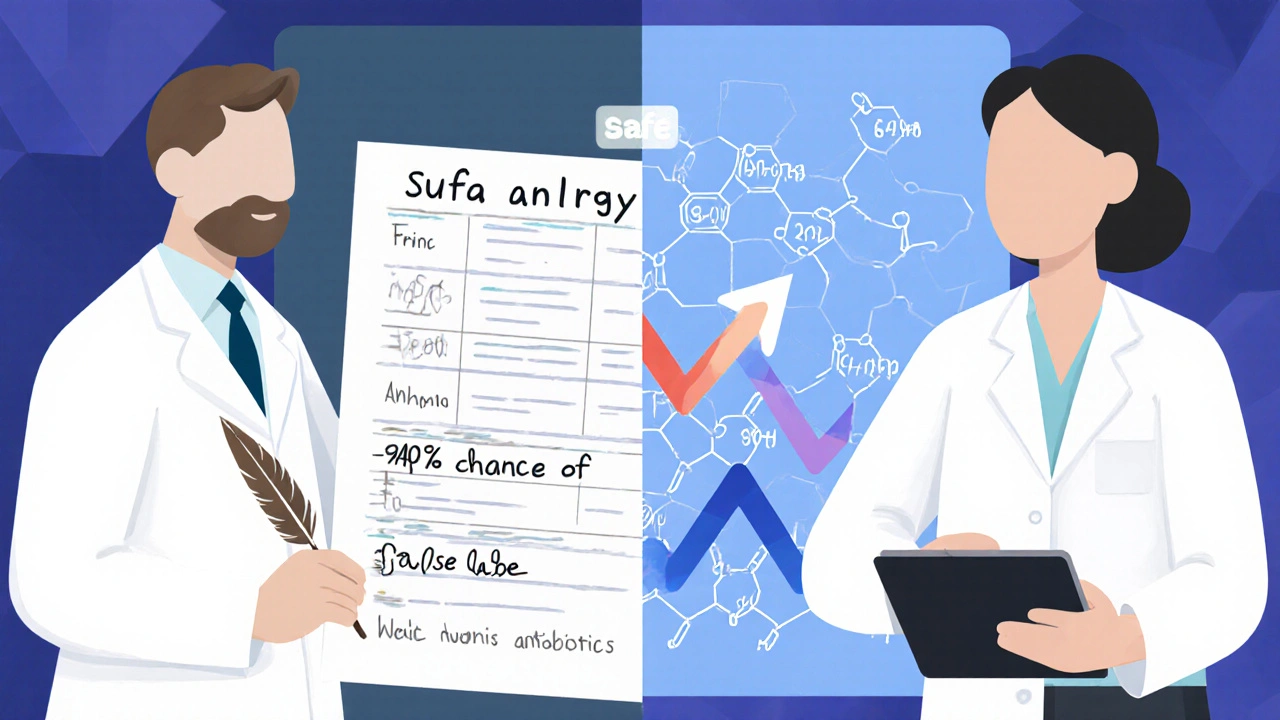
What You Should Still Avoid - and Why
There are exceptions. Not all nonantibiotic sulfonamides are safe if you’ve had a severe reaction to an antibiotic sulfonamide. The biggest red flag is dapsone, used to treat leprosy, certain skin conditions, and Pneumocystis pneumonia (PCP) in immunocompromised patients. Dapsone shares the same N4-arylamine structure as sulfamethoxazole. Studies show about 13% of people with a true sulfonamide antibiotic allergy react to dapsone. That’s not high - but it’s high enough to warrant caution. If you’ve ever had a severe reaction - like blistering skin, fever, or trouble breathing - after taking a sulfa antibiotic, you should avoid dapsone unless you’ve been tested by an allergist. Same goes for sulfasalazine, used for ulcerative colitis and rheumatoid arthritis. It contains a sulfonamide group linked to an antibiotic-like structure.Why This Matters More Than You Think
When doctors avoid sulfonamide antibiotics because of a mislabeled allergy, they reach for alternatives - often broader-spectrum drugs like fluoroquinolones (Cipro, Levaquin). These carry black box warnings from the FDA for tendon rupture, nerve damage, and aortic aneurysm. They’re also more likely to cause C. diff infections and contribute to drug-resistant superbugs. A 2021 study found that patients with a "sulfa allergy" label were 78% more likely to get a different antibiotic - and over 30% of those were unnecessary broad-spectrum drugs. That’s not just a personal risk. It’s a public health crisis. The CDC estimates that inappropriate antibiotic use due to false sulfa allergy labels increases resistance in E. coli by 8.3% and in Staphylococcus aureus by 12.7%. And the financial cost? Over $1.2 billion a year in the U.S. alone - from longer hospital stays, more expensive drugs, and extra testing.What You Should Do Right Now
If you’ve been told you have a "sulfa allergy," here’s your action plan:- Check your medical record. Does it say "sulfa allergy" - or does it say "mild rash on day 5 of Bactrim"? Vague labels are the problem. Be specific.
- Ask your doctor: "Was this a true allergic reaction, or a side effect?" If you don’t know, ask for a referral to an allergist.
- Get tested if needed. For low-risk reactions (delayed rash, no breathing trouble), an allergist can do an oral challenge in the office. Over 94% of people who’ve been told they’re allergic pass the test.
- Remove the label if cleared. Once you’re cleared, ask your doctor to update your chart. Tell every new provider you see.
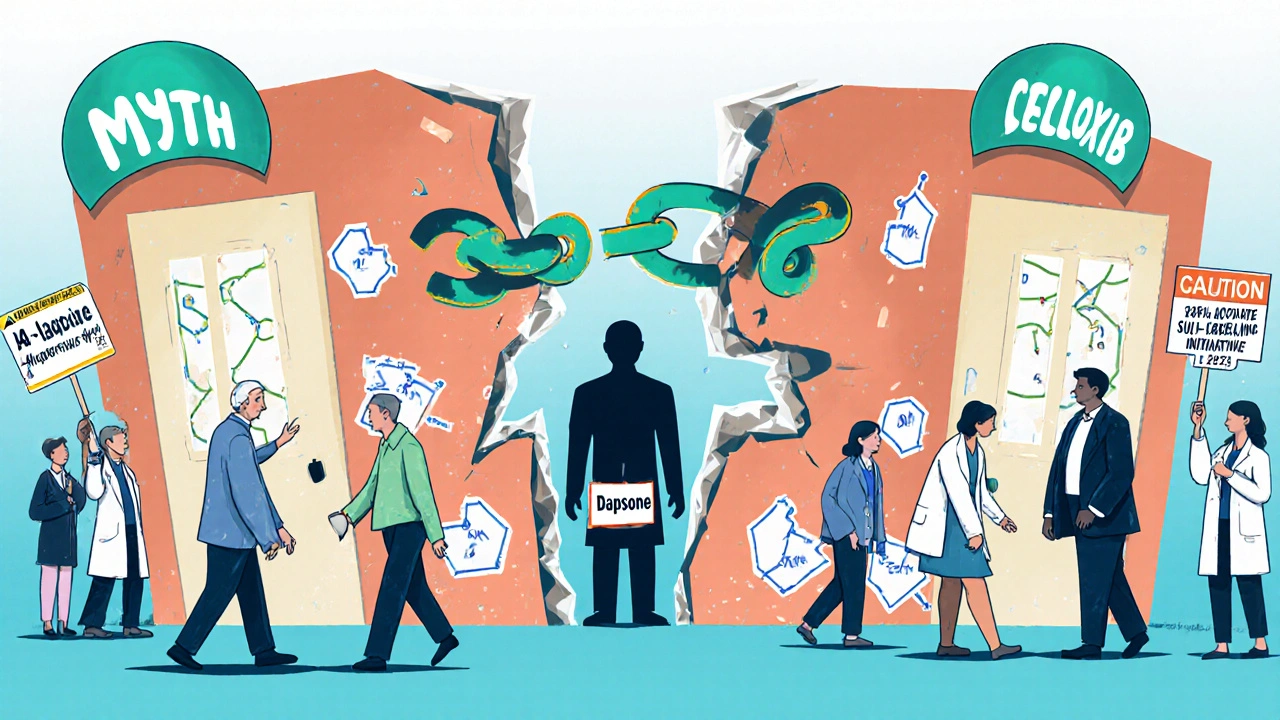
Common Misconceptions
There’s a lot of noise out there. Let’s clear it up:- "I can’t take any medication with sulfur." False. Sulfur, sulfates, and sulfites are chemically different from sulfonamides. You can safely take Epsom salts, IV contrast dye, or wine if you have a sulfa allergy.
- "My grandma had a reaction, so I must too." Family history doesn’t predict drug allergies. Each reaction is individual.
- "I had a rash once, so I’m allergic forever." Many rashes from antibiotics are not allergic. And even if they were, people often outgrow drug allergies.
What’s Changing in 2025
Health systems are finally catching up. The Sulfonamide Allergy De-labeling Initiative, launched in 2023 by the AAAAI and Infectious Diseases Society of America, gives clinics step-by-step protocols to safely remove false allergy labels. Electronic health records like Epic now have built-in alerts that flag when a patient is being denied a safe, effective drug because of a vague "sulfa allergy" note. A new tool called the SULF-RISK score - developed in 2022 - helps doctors predict who’s likely to have a true allergy versus a false label. It looks at reaction type, timing, severity, and age at reaction. It’s 92% accurate. By 2025, 75% of major U.S. hospitals are expected to have automated systems that prompt providers to question vague allergy labels - and offer testing instead of avoidance.Final Thought: Don’t Let a Label Limit Your Care
You deserve the right treatment - not the safest guess. A vague "sulfa allergy" label might have protected you from one rash decades ago. But today, it’s putting you at risk for worse outcomes: unnecessary side effects, resistant infections, and limited options when you’re truly sick. If you’ve been avoiding hydrochlorothiazide, celecoxib, or furosemide because of a childhood reaction - talk to your doctor. Ask about testing. Ask for an allergist referral. Ask to remove the label if you’re cleared. Your health isn’t defined by a note in a chart. It’s defined by what you can safely take - and what you’re being denied because of a myth.Can I take hydrochlorothiazide if I have a sulfa allergy?
Yes, you can. Hydrochlorothiazide is a nonantimicrobial sulfonamide and does not share the chemical structure that causes allergic reactions to sulfonamide antibiotics like sulfamethoxazole. Studies show the risk of reaction is only about 1.1% - the same as people without any sulfa allergy label. Most allergists consider it safe to use, even in patients with documented sulfonamide antibiotic allergies.
Is celecoxib (Celebrex) safe for people with sulfa allergies?
Yes. Celecoxib contains a sulfonamide group but lacks the N4-arylamine structure found in antibiotic sulfonamides. Multiple large studies, including one with over 10,000 patients, found no increased risk of allergic reactions to celecoxib in people with sulfonamide antibiotic allergies. The FDA requires its label to state it does not contain the allergenic elements of sulfa antibiotics.
What’s the difference between sulfa, sulfate, and sulfite?
They’re completely different chemicals. Sulfa refers to sulfonamide drugs, which have a specific structure linked to allergies. Sulfates (like magnesium sulfate) are salts used in IV fluids or Epsom baths. Sulfites are preservatives in wine and dried fruit. None of these share the molecular structure that causes sulfonamide antibiotic allergies. You can safely take all three if you have a sulfa allergy.
Can I outgrow a sulfa allergy?
Yes, especially if your reaction was mild or occurred in childhood. Many people labeled with sulfa allergy in the past had non-allergic rashes or side effects that never returned. Studies show that up to 90% of people with a history of sulfa allergy can safely tolerate sulfonamide antibiotics after proper testing. Don’t assume the label still applies - get it checked.
Should I avoid dapsone if I have a sulfa allergy?
Proceed with caution. Dapsone shares the same N4-arylamine structure as antibiotic sulfonamides and carries a higher risk of cross-reactivity - about 13% in people with prior sulfonamide antibiotic allergies. If you’ve had a severe reaction to a sulfa antibiotic, avoid dapsone unless you’ve been evaluated by an allergist. For mild or unclear reactions, a supervised challenge may be safe.
How do I get my sulfa allergy label removed?
Start by asking your primary doctor to refer you to an allergist. If your reaction was mild (like a rash that appeared more than 72 hours after taking the drug), you may be able to undergo a supervised oral challenge in the office. If it was severe (hives, swelling, breathing trouble), skin testing may be needed first. Once cleared, ask your doctor to update your medical record and notify all providers. This simple step can open up safer, more effective treatment options.
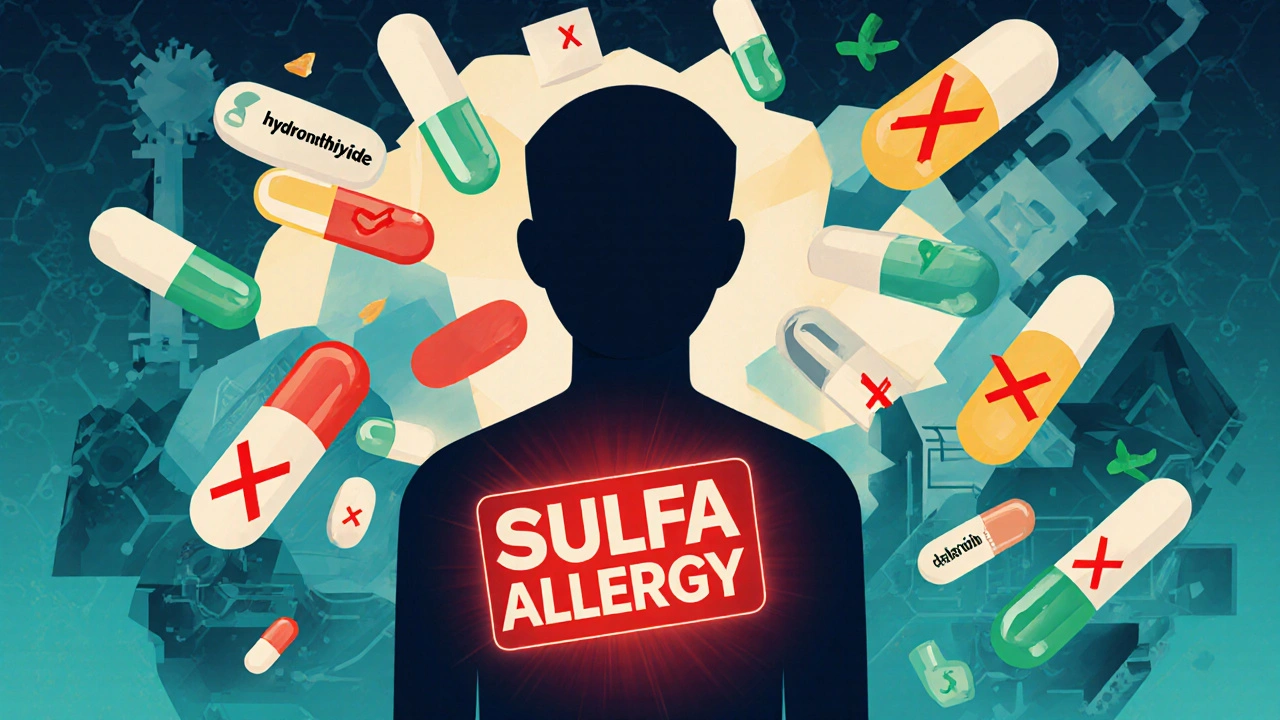

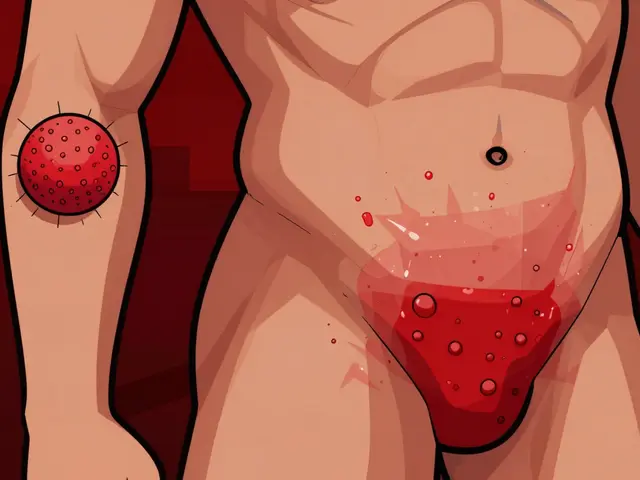
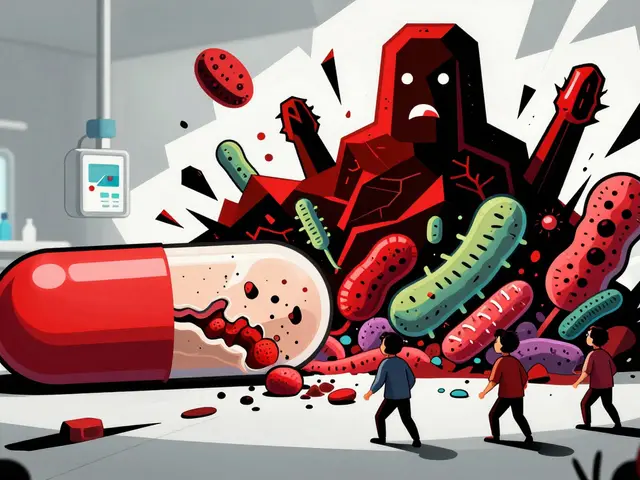
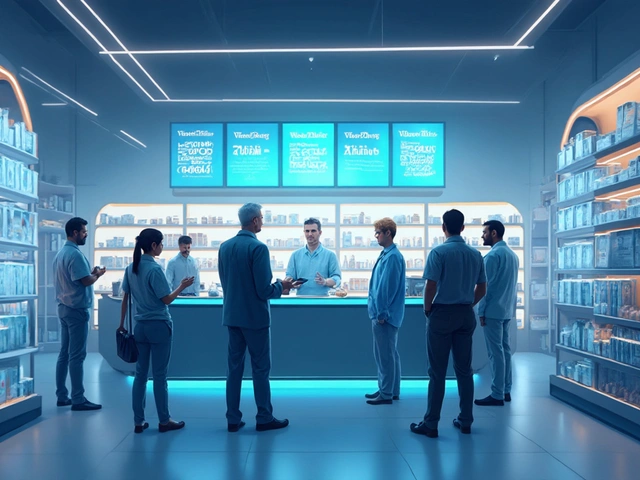
so like... if i ate a taco with sulfites and got a rash, does that mean i'm allergic to wine and also the devil? because i swear i saw a demon in my sour cream once and now i'm scared of nachos.
October 31Julisa Theodore